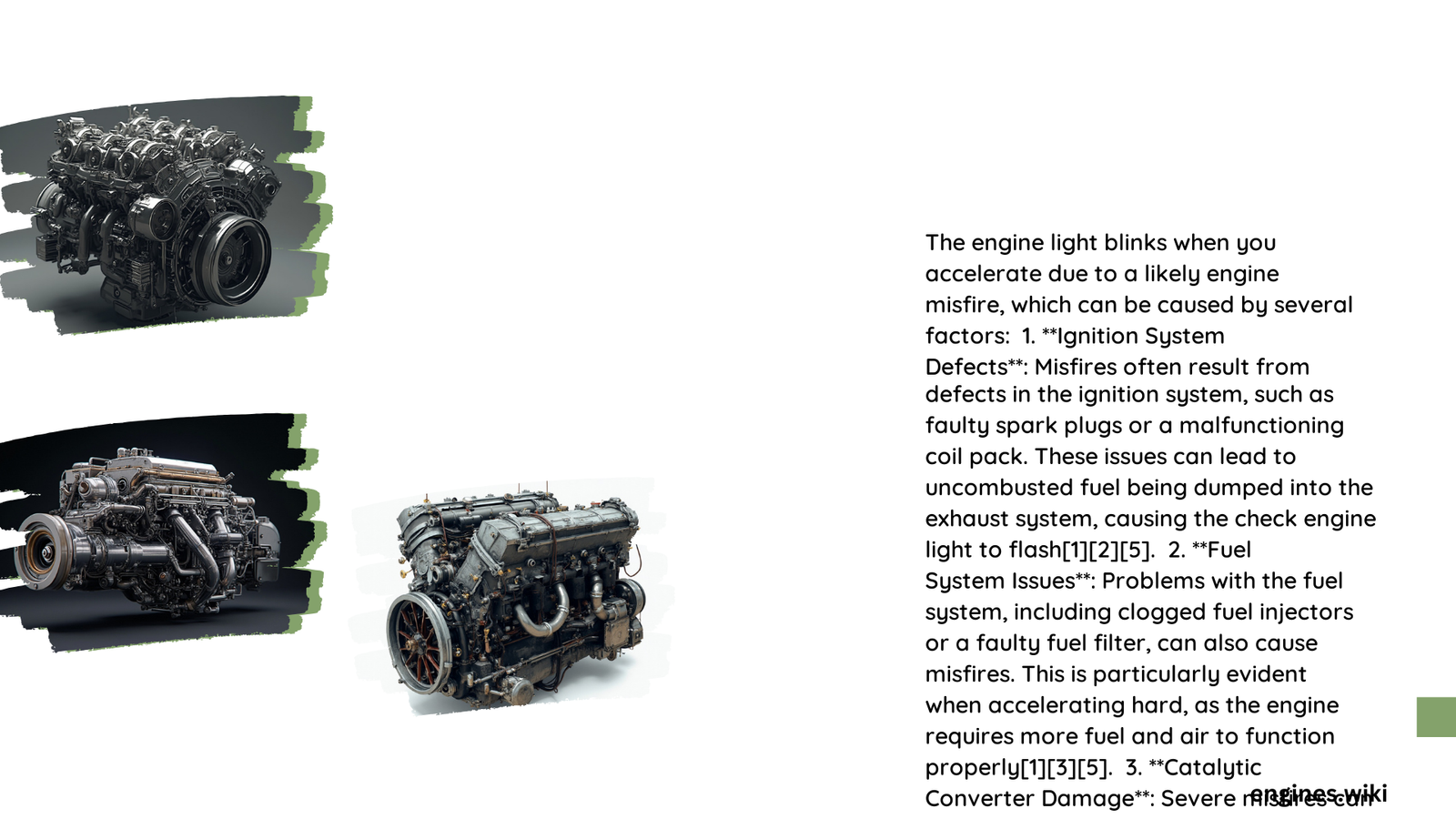When your engine light blinks during acceleration, it’s a serious warning sign that requires immediate attention. This issue typically indicates engine misfires, which can lead to severe damage if not addressed promptly. Understanding the causes, diagnostic methods, and potential solutions is crucial for maintaining your vehicle’s health and preventing costly repairs.
What Causes the Engine Light to Blink During Acceleration?
The primary reasons for a blinking engine light during acceleration include:
- Ignition system problems
- Fuel system issues
- Internal engine complications
- Sensor malfunctions
Let’s delve deeper into each of these causes:
Ignition System Problems
- Faulty spark plugs
- Worn-out ignition coils
- Damaged spark plug wires
These components are crucial for proper combustion. When they fail, misfires occur, triggering the engine light to blink.
Fuel System Issues
- Clogged fuel injectors
- Malfunctioning fuel pump
- Blocked fuel filter
An improper fuel-air mixture can lead to misfires and poor acceleration, causing the engine light to blink.
Internal Engine Complications
- Low compression in cylinders
- Vacuum leaks
- Timing chain or belt issues
These problems affect the engine’s ability to run smoothly, especially during acceleration.
Sensor Malfunctions
- Faulty oxygen sensors
- Mass airflow sensor issues
- Crankshaft position sensor failures
While less common, sensor malfunctions can sometimes cause the engine light to blink during acceleration.
How Can I Diagnose the Problem When My Engine Light Blinks During Acceleration?

Diagnosing the issue requires a systematic approach:
- Use an OBD-II scanner to retrieve fault codes
- Inspect ignition components visually
- Check fuel pressure and injector performance
- Perform a compression test
- Examine sensor readings
OBD-II Scanner Diagnosis
Connect an OBD-II scanner to your vehicle’s diagnostic port. Look for misfire codes (P0300-P0308) which often correlate with a blinking engine light.
Visual Inspection
Examine spark plugs, ignition coils, and wires for signs of wear or damage. Look for:
- Fouled or damaged spark plugs
- Cracked ignition coil housings
- Frayed or brittle spark plug wires
Fuel System Check
Use a fuel pressure gauge to ensure proper fuel pressure. Inspect fuel injectors for clogging or leaks.
Compression Test
Perform a compression test on all cylinders to identify any with low compression, which can cause misfires.
Sensor Examination
Use a multimeter or specialized diagnostic tool to check sensor readings and ensure they’re within manufacturer specifications.
What Are the Potential Consequences of Ignoring a Blinking Engine Light?
Ignoring a blinking engine light can lead to:
- Catalytic converter damage
- Increased emissions
- Reduced fuel efficiency
- Engine performance degradation
- Potential engine failure
The most severe consequence is catalytic converter damage, which can be extremely costly to repair or replace.
How Can I Fix the Issue of My Engine Light Blinking During Acceleration?
The fix depends on the underlying cause:
Ignition System Repairs
- Replace spark plugs: $100-$300
- Install new ignition coils: $100-$300 per coil
- Replace spark plug wires: $50-$200
Fuel System Solutions
- Clean or replace fuel injectors: $200-$500 per injector
- Install a new fuel pump: $300-$1000
- Replace fuel filter: $50-$200
Internal Engine Repairs
- Fix vacuum leaks: $100-$500
- Replace timing chain or belt: $500-$2000
- Rebuild or replace engine (severe cases): $2500-$7000+
Sensor Replacements
- Oxygen sensor replacement: $200-$500
- Mass airflow sensor: $200-$400
- Crankshaft position sensor: $150-$300
What Preventive Measures Can I Take to Avoid Engine Light Blinking Issues?
To prevent future occurrences:
- Follow regular maintenance schedules
- Use high-quality fuel and oil
- Address minor issues promptly
- Avoid aggressive driving habits
- Keep your vehicle’s computer system updated
When Should I Seek Professional Help for a Blinking Engine Light?
Seek professional help immediately if:
- You lack the tools or expertise for diagnosis
- The problem persists after basic troubleshooting
- You notice severe performance issues
- The vehicle is under warranty
Professional mechanics have advanced diagnostic tools and expertise to quickly identify and resolve complex issues.
What Are the Long-Term Implications of Recurring Engine Light Blinking During Acceleration?
Recurring issues can lead to:
- Increased wear on engine components
- Higher repair costs over time
- Decreased vehicle resale value
- Potential safety hazards
- Reduced overall vehicle lifespan
Address recurring problems promptly to avoid these long-term consequences.
By understanding the causes, diagnosis methods, and solutions for a blinking engine light during acceleration, you can take prompt action to protect your vehicle and avoid costly repairs. Remember, a blinking engine light is a serious warning that should never be ignored.
References:
1. Freds Auto Repair: What to do When Your Check Engine Light Is Blinking?
2. Westside Car Care: Here’s What to Do When Your Check Engine Light Starts Flashing
3. AutoZone: Check engine light blinking and car is delayed while accelerating
